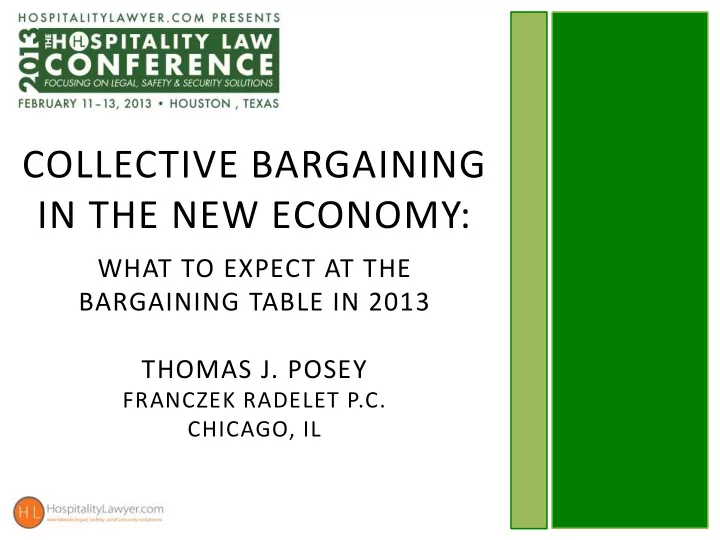

COLLECTIVE BARGAINING IN THE NEW ECONOMY: WHAT TO EXPECT AT THE BARGAINING TABLE IN 2013 THOMAS J. POSEY FRANCZEK RADELET P.C. CHICAGO, IL
COLLECTIVE BARGAINING IN THE NEW ECONOMY Tom Posey Franczek Radelet P.C. - Chicago • Represents Hospitality Industry Employers in Collective Bargaining, Arbitrations and NLRB Matters • Also Represents Employers in Federal and State Litigation and Jury Trials • Named One of “40 Illinois Attorneys Under 40 to Watch” in 2011
COLLECTIVE BARGAINING IN THE NEW ECONOMY WHAT TO EXPECT AT THE BARGAINING TABLE IN 2013
COLLECTIVE BARGAINING IN THE NEW ECONOMY WHAT TO EXPECT AT THE BARGAINING TABLE IN 2013 HOW DID WE GET HERE? NAVIGATING THE NEW LANDSCAPE MOVING FORWARD – WHAT TO EXPECT IN 2013 AND BEYOND MULTI-EMPLOYER BARGAINING – ADVANTAGES AND PITFALLS
HOW DID WE GET HERE? The Recession The New NLRB
NAVIGATING THE NEW LANDSCAPE HOW DID THE RECESSION AND THE NEW NLRB IMPACT EMPLOYERS’ 2009 -2012 NEGOTIATIONS CASE STUDY: Hotel Negotiations with UNITE HERE Several Common Themes Across The Hospitality Industry Similar Contract Language Shared Goals And Parallel Bargaining Strategies Union’s Approach To Bargaining Indicative Of Larger Trends
2009-2012 NEGOTIATIONS Contracts Expired August 31, 2009 Major Chains In Simultaneous Negotiations In Multiple Cities Union Negotiating With Each Company Individually Single/Smaller Hotels Entered “Me Too” Agreements
2009-2012 NEGOTIATIONS New Contract Term From September 2009 to August 2013 Negotiations Continued Through Mid-2011 And Some Agreements Were Not Executed Until 2012 One Employer Still Has No Agreement 7 Months Until The Current CBAs Expire
MANAGEMENT’S APPROACH Reduction of Operating Costs Critical Proposals Focused On: Wages – Small Step Increases / Freezes / Reductions Health Insurance – Start Employee Contributions Scheduling – Reduce Overtime Subcontracting Workload Restrictions Information Requests – Open the Books
UNION’S APPROACH: SETTING THE STAGE FOR 2013 Strategy - National Focus Successorship Subcontracting Single Employer Bargaining Other Tactics
UNION’S APPROACH: SETTING THE STAGE FOR 2013 Strategy - National Focus Coordinated Efforts in Multiple Cities Scheduling Delays Tentative Agreements
UNION’S APPROACH: SETTING THE STAGE FOR 2013 Successorship Require Purchasers and Management Companies to Assume CBA Extend Obligation to Affiliated Companies
UNION’S APPROACH: SETTING THE STAGE FOR 2013 Subcontracting Using Non-Employees to Perform Work Expand to Include Purchasing Products Specialty Items Wedding Cakes Indian/Kosher Catering Boxed Lunches
UNION’S APPROACH: SETTING THE STAGE FOR 2013 Single Employer Bargaining San Francisco Hotels Multiemployer Group Hotel Employers’ Labor Relations Association (Chicago) Me Too Agreements
UNION’S APPROACH: SETTING THE STAGE FOR 2013 Other Tactics Press Conferences Boycott Lists Flash Mobs Social Media
UNION’S APPROACH: SETTING THE STAGE FOR 2013 Other Tactics Press Conferences Boycott Lists Flash Mobs Social Media
WHAT TO EXPECT IN 2013
WHAT TO EXPECT IN 2013 Contract Provisions and Terms “Catch Up” Wage Increases Extended Contract Duration Strong Successorship Language National Strategy – Part II
WHAT TO EXPECT IN 2013 Contract Provisions and Terms Are Standard Agreements the Next Step?
WHAT TO EXPECT IN 2013 Making and End Run: Legislation Providence, RI - Successor Ordinance Cook County, IL – Housekeeper Breaks Templates for National Efforts
EMPLOYER STRATEGIES Multi-Employer Bargaining
EMPLOYER STRATEGIES Multi-Employer Bargaining Advantages Risks and Pitfalls Union Response
MULTI-EMPLOYER BARGAINING Legal Principles Formation Withdrawal Individual Bargaining
MULTI-EMPLOYER BARGAINING Economics Spread Costs Among the Group Reduce Costs Related to Time Loss Information Requests / Proposals
MULTI-EMPLOYER BARGAINING Strike Protection Lockouts / Mutual Aid Agreements Replacement Workers Targeted Strikes
MULTI-EMPLOYER BARGAINING Achieving Bargaining Objectives Information Sharing Common Bargaining Strategies Loss of Autonomy Divide and Conquer Approach
MULTI-EMPLOYER BARGAINING Me Too Agreements Minimal Costs Get What You Pay For Strike / Picketing Protection Target On Your Back?
COLLECTIVE BARGAINING IN THE NEW ECONOMY QUESTIONS?
Recommend
More recommend